ABOUT US
MISSION
As the global community moves to expand renewables and achieve universal access to clean energy, indigenous people are in danger of being left behind. Despite comprising a large proportion of the rural poor with no access to energy, indigenous peoples are a critical demographic in terms of energy access suffer invisibility as a group.
In addition to this, indigenous peoples are disproportionately disadvantaged by large-scale energy projects. Their territories often host renewable energy projects but their human rights are repeatedly not respected and communities have suffered displacement, conflicts and destruction of livelihoods.
The Right Energy Partnership with Indigenous Peoples (REP) is an indigenous-led, multi-stakeholder partnership with the goal of increasing renewable energy systems that respect human rights and leveraging the leadership of indigenous communities to develop solutions.
The Partnership will work to:
- Ensure that renewable energy projects are fully aligned with the respect and protection of human rights.
- By 2030 provide least 50 million indigenous peoples access to renewable energy that is developed and managed in ways that are consistent with their self-determined needs and development aspirations.
WHAT WE DO
Capacity Building and Knowledge Exchange
The Right Energy Partnership recognizes the unique challenges faced by Indigenous communities and the importance of promoting capacity building and knowledge exchange as a means to support their self-determined sustainable development on renewable energy. We work in partnership with Indigenous communities to build capacity and share knowledge, highlighting resources and information on renewable energy aimed at promoting Indigenous-led development. Through our work, we aim to support the revitalization of Indigenous knowledge systems, promote traditional ecological practices, and empower Indigenous peoples to lead their own development. Join us in exploring the transformative power of capacity building and knowledge exchange for Indigenous peoples and a more just and sustainable world.
Access to Energy
The Right Energy Partnership recognizes that Indigenous communities often face unique challenges in accessing modern energy services and that renewable energy can provide a sustainable and empowering solution. The partnership works to facilitate support for indigenous-led initiatives highlighting the innovative and community-led solutions that are making a difference.
Research and Advocacy
The Right Energy Partnership conducts research and advocacy in promoting sustainable and equitable development for Indigenous communities, particularly in the area of renewable energy. The partnership undertakes research and advocates for policies and practices that support a just transition to clean energy that recognizes and respects indigenous peoples rights. The partnership aims to raise awareness of the unique challenges faced by Indigenous communities in accessing modern energy services, promote the potential of renewable energy to support Indigenous-led development, and support policy and practice changes that ensure the promotion, protection and respect of Indigenous rights.
WORKING IN PARTNERSHIP
Indigenous-led, Partnership Driven
The Partnership is led by indigenous communities and organisations and is open to different development actors and stakeholders provided they will commit to abide by the Partnership Principles and can make direct and concrete contributions in achieving the objectives and targets of the Partnership. As an open Partnership platform, those wishing to be part of this Partnership shall formally complete a Partnership form which will indicate their commitment to abide by the partnership principles and their concrete contribution that can be reported and verified on a regular basis. Partners may include, but are not limited to:
- Indigenous communities and representative institutions
- Indigenous Peoples’ Organisations
- Organisations and institutions working on indigenous peoples’ and human rights
- UN Agencies, multi-lateral and bi-lateral agencies
- National and local governments
- Philanthropic institutions, foundations and funding agencies
- Research institutions
- Human rights organisations and institutions
- Advocate NGOs including those working on business and human rights, service NGOs, environment organisations, experts on renewable energy technologies
- Social entrepreneur organisations and networks
- Private sector/renewable energy companies
- Indigenous-led and other media
Partnership Principles
The Partnership and all participating partners must adhere to the following principles and values:
- Respect and uphold human rights, including uphold the UN Declaration on the Rights of Indigenous Peoples, the collective rights of indigenous peoples and the right of indigenous people to free, prior and informed consent (FPIC).
- Equitable benefit sharing and the promotion of equity. This includes a focus on actions that support the poor and not only wealthier community members who are better placed to participate and benefit from actions. Activities supported by the Partnership shouldn’t create wealth and power gaps in the community and ensure that those further left behind are clearly targeted to include indigenous persons with disabilities, the elderly, and young people, among others
- Full inclusion and empowerment of indigenous women. This is a core objective of the Partnership and activities must have a strong gender focus to ensure the perspectives, concerns and aspirations of indigenous women are accounted for and they become key actors and beneficiaries.
- Respect and promotion of self-determined sustainable development. Activities will be focused on ensuring broad gains in self-determined sustainable development and livelihood that is culturally sensitive. This includes the holistic approach of indigenous peoples in addressing poverty, food insecurity and the overall wellbeing of indigenous peoples in the achievement of inter-related goals for sustainable development.
- Full participation and empowerment of indigenous communities. The Partnership will prioritise participatory approaches with a focus on community-led and -centred renewable energy and ensure that the poorest and most marginalized members of the community are included, such as persons with disabilities, elderly and young people, among others.
- Uphold indigenous leadership of the Partnership as a critical principle. By putting the target beneficiaries in the centre of designing and leading in solutions, there is a much higher chance of the Partnership being effective in reaching its goals. Furthermore, the traditional knowledge and innovation of indigenous peoples on the ground must be recognised and promoted in the implementation of SDG 7 and the Paris Agreement.
- Transparency, accountability and mutual respect must be the cornerstone of a partnership between indigenous peoples and other stakeholders to ensure that the Partnership can engender trust and positive, generative working relationships between different stakeholders. Additionally, indigenous stakeholders must uphold principles of transparency and accountability to build trust in the Partnership’s activities.
WHO WE ARE
BOARD OF DIRECTORS
Myrna Kay Cunningham Kain
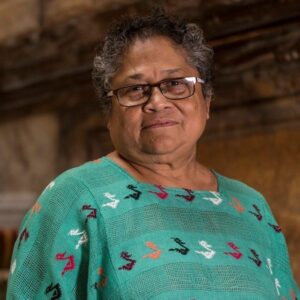
Myrna Kay Cunningham Kain has 40+ years of experience in accompaniment, studies, facilitation and application of policies, strategies and programs based on approaches to the individual and collective human rights of Indigenous Peoples, especially in the fields of education, intercultural health, gender and intergenerational relations and indigenous self-government, multi-ethnic and development with identity- Good Living.
A member of the Miskitu indigenous people of the Waspam community, located on the banks of the Wangki River in Nicaragua, she has participated in the negotiations for the establishment of the autonomy regime for the Indigenous Peoples and ethnic communities of the Caribbean Coast of Nicaragua and throughout the last 35 years has accompanied the process of its implementation.
Joan Carling
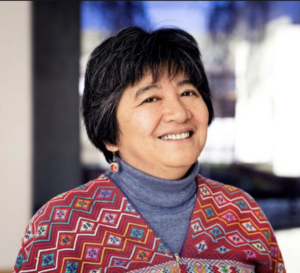
Joan Carling serves as the Global Director for Indigenous Peoples Rights International, an organization that works to end the criminalization of people defending Indigenous rights. She is also a Board Member of the REP. She is an indigenous activist from the Cordillera with more than 20 years’ experience of working on indigenous issues from the grassroots to the international level.
Adrian Lasimbang
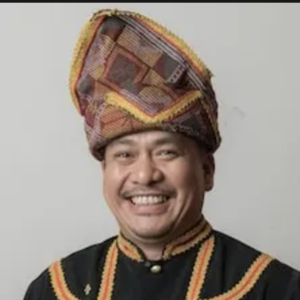
Adrian Lasimbang is an Indigenous activist with over 20 years of experience in developing renewable energy solutions to improve the livelihood of rural communities. A self-taught innovator, he has installed micro-hydro systems in indigenous villages across Malaysia and trained community groups in resource management and customary rights protection. Was former president and founder of Jaringan Orang Asal SeMalaysia (JOAS) the umbrella body for Orang Asal organisations in Malaysia. He also founded TONIBUNG a Social Enterprise that promotes Renewable Energy and appropriate Technologies. TONIBUNG runs CREATE Borneo (Centre for REnewable energy and Appropriate TEchnologies) in Sabah Malaysia providing Youths from rural areas training in Renewable Energy Technologies and conduct research and development on appropriate solutions for problems faced by rural communities. Former Senator at the upper house of the Malaysian Parliament.
Ikal Angelei

Ikal Angelei is an indigenous activist from Kenya. She was awarded the Goldman Environmental Prize in 2012, in particular for her voicing of environmental implications of the Gilgel Gibe III Dam, speaking on behalf of Kenyan indigenous communities. She is the founder of the organisation Friends of Lake Turkana which campaigns for environmental justice in the region around the Lake Turkana.
Dmitry Berezhkov
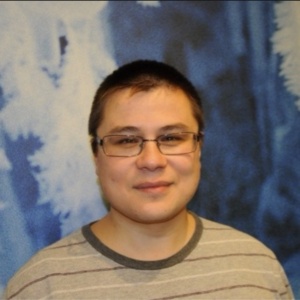
Dmitry Berezhkov is the former Vice President of RAIPON, the Russian Association of Indigenous Peoples of the North and Chief Editor of Indigenous Russia.
China Ching
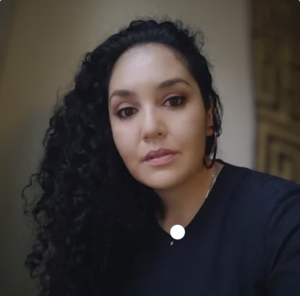
China Ching, a native Hawaiian is the Executive Director of the Montana Racial Equity Project (MTREP) becoming its first indigenous executive director
Throughout her career, China has focused on equity, justice, Indigenous rights and the building of community power and solidarity. She is currently a consultant specializing in organizational and leadership development, program strategy and the building of holistic organizational cultures.
China is the former Director of Programs at Christensen Fund, an international foundation working to support Indigenous Peoples in advancing their inherent rights, dignity, and self-determination.
